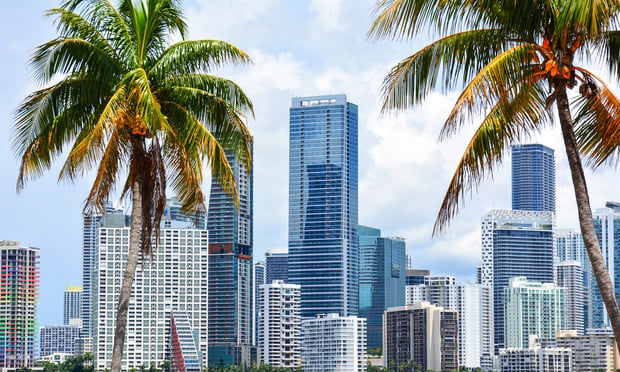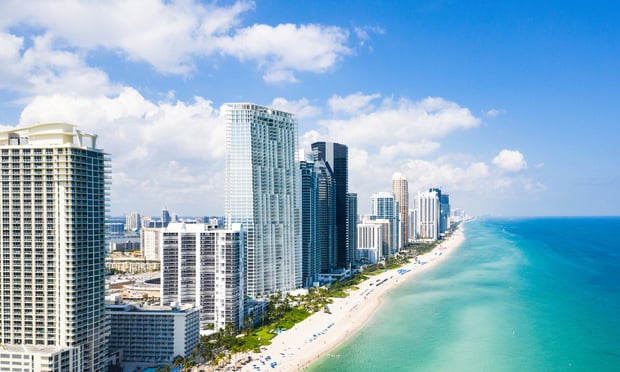"People will always come here. There is only one Miami Beach." That was my grandfather's prediction when South Florida was in dire straits during the Great Recession of 2008. I frequently find myself reflecting on those words during the COVID-19 pandemic. Health and safety must remain everyone's first concern, but while keeping those foremost in mind, I believe there is room to be optimistic in the long-term about South Florida's economy, given our area's attractiveness to residents from other states and foreign individuals.
Residents From Other States
Many residents from other states have been hesitant to move to South Florida because of traffic or historic shortage of opportunities in certain professional service or technology-related occupations. However, the COVID-19 pandemic has likely forever changed lifestyle preferences. The technology to work from home will continue to be perfected as individuals desire to have more flexibility. South Florida's weather and low taxes will continue to draw individuals who no longer need a daily commute but can log in to work during the day and then enjoy the benefits of South Florida after hours. Individuals may also desire to live in a vacation-like location if air travel cannot be relied on consistently.
It will be important for such individuals to establish "domicile" in Florida to secure the full benefits of being a Florida resident. Florida case law provides that a domicile is the place where a person has an abode with the intention of making it his permanent home. In order to claim Florida domicile, an individual typically takes certain acts such as registering to vote in Florida, changing vehicle registration to Florida and obtaining a Florida driver's license. A best practice is typically also for an individual to file a "Declaration of Domicile." However, the termination of the previous domicile can be a more complicated process as many states, including New York, are very aggressive about challenging a former resident's change of domicile. An individual would generally be required to show that the prior domicile was abandoned. Furthermore, the individual would generally be required to spend less than half the year in the old state in order to avoid still being considered a state tax resident.
Foreign Individuals Seeking to Move to South Florida
With the COVID-19 pandemic severely impacting many countries in Western Europe and South America, interest in residing in South Florida, which has always been a welcoming gateway to international immigrants, will continue to grow. The current pandemic-related restrictions on immigration cannot be reasonably expected to last forever.
Foreign individuals who are considering a potential future move to South Florida should begin planning now. There are certain pre-immigration planning strategies, which are generally only effective prior to a physical move or obtainment of permanent residence status. For example, a foreign individual may dispose of certain assets, such as foreign mutual funds, before becoming a U.S. income tax resident to not only reduce potential U.S. tax exposure but also to reduce their U.S. tax compliance burden. Furthermore, gifts of intangible property and foreign real estate prior to the grantor's change of domicile to the United States may generally be accomplished without U.S. tax consequences.
Foreign Individuals Seeking Vacation Homes or Investment Properties
In recent years, many high-net-worth foreign individuals have valued ownership of a South Florida condominium as both a status symbol and safe investment. However, before signing a contract, many foreign individuals do not realize that ownership of the property either directly in their name or through a Florida limited liability company may result in an unexpected U.S. estate tax exposure. While U.S. citizens and individuals domiciled in the United States currently have a U.S. estate tax exemption on worldwide assets of $11,580,000, an individual domiciled outside the United States is only entitled a U.S. estate tax exemption of $60,000 on U.S. situs assets, such as U.S. real property. As a result, a South Florida property could easily be subject to the maximum estate tax rate of 40%.
Advance U.S. tax planning is required to mitigate such exposure. Frequently, structures utilizing trusts or a combination of both foreign and U.S. entities are used. It should be noted that the process to restructure ownership after an individual has acquired the South Florida property can be a significantly more expensive process than originally contracting the property in the proper ownership structure.
My grandfather, who was born into the Great Depression but always tried to find a silver lining, passed away years before the COVID-19 pandemic crisis. His optimism for South Florida still resonates today. Interested residents and investors should take steps now to prepare to safely join the next generation of South Floridians.
Logan E. Gans is a partner in the tax and international law practice group of Shutts & Bowen in Miami. Contact him at [email protected].
Want to continue reading?
Become a Free ALM Digital Reader.
Once you are an ALM Digital Member, you’ll receive:
- Breaking commercial real estate news and analysis, on-site and via our newsletters and custom alerts
- Educational webcasts, white papers, and ebooks from industry thought leaders
- Critical coverage of the property casualty insurance and financial advisory markets on our other ALM sites, PropertyCasualty360 and ThinkAdvisor
Already have an account? Sign In Now
*May exclude premium content© 2025 ALM Global, LLC, All Rights Reserved. Request academic re-use from www.copyright.com. All other uses, submit a request to [email protected]. For more information visit Asset & Logo Licensing.








